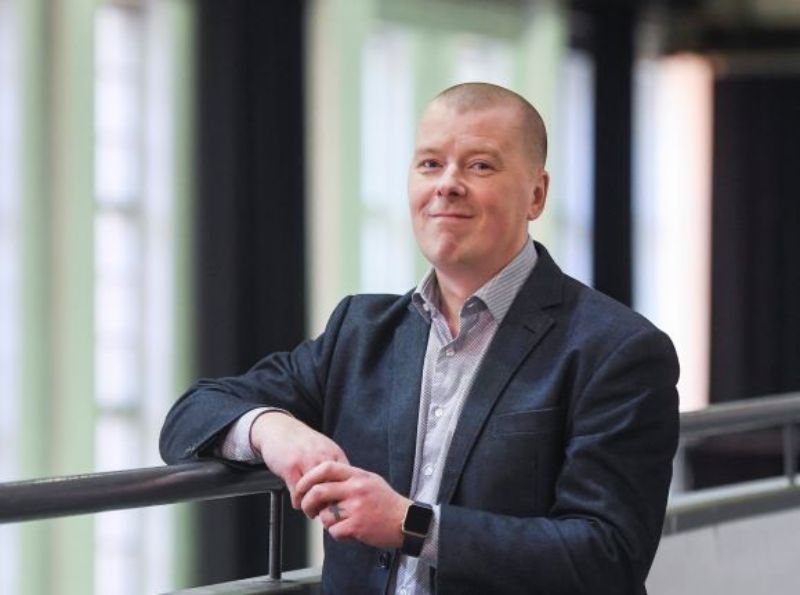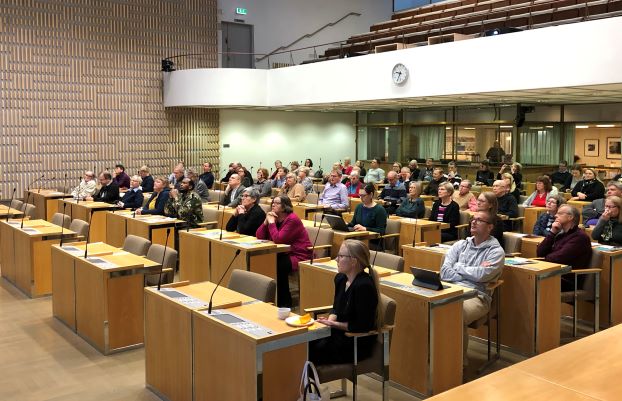Guest blogger: Digital literacy is important in both civic and working life
- Blog

Image Source Helsinki City Data Bank, Kimmo Brandt
Do you know how to swim, check the battery in a smoke alarm, identify poisonous mushrooms, recycle? This kind of know-how is sometimes referred to as ‘civic skills’. Managing our affairs, ensuring the week goes by without a hitch, and even keeping ourselves and others alive can all depend on these skills. But our operating environments and the skills required within them are rapidly changing. How can we make utilising new technologies part of our own everyday skill-set? When does the new and unfamiliar become something we’re used to? How can something that at first feels difficult transform into an indispensable everyday tool? How does digital literacy become part of our civic skills and is it something you need to master?
When it comes to the issue of improving the digital know-how of the average citizen, it will come as no surprise that Helsinki has long been leading the way. The Helsinki metropolitan area tends to attract technological expertise, many businesses, and a large number of residents. And in this context, residents also equate to a need for services, including IT and digital support. In Helsinki, this service has been provided in many forms since 1994.
The need for digital support has been often questioned
It might come as a surprise that the need for civic digital support has been often brought into question over the years. For those of us who work to strengthen the IT and communication skills of the city's residents this need is not in doubt, though. Indeed, as the technology that shapes our everyday activities changes and develops, the need for user support increases. Even during the period 2002-2010, there was still a need for devices that provided free access to the Internet and online services. WLAN networks were also in demand.
In 2012, STT – the Finnish News Agency – reported that the technological know-how of all working age adults was insufficient. In fact, several newspapers, including the Helsingin Sanomat and Savon Sanomat, published articles on this topic. The Helsingin Sanomat even ran the headline that ‘Effective use of the Internet is more important than a driving license’, and interviewed customers of digital advisory services and an expert researcher in this area.
The stories printed at the turn of 2012 and 2013 came as welcome news, as there was still an ongoing debate at that time about whether or not digital advice was needed or was, in fact, last winter's snow — something that was now redundant. Has digital marginalisation already been prevented? As hardware and software become increasingly affordable and available to more and more people, perhaps this is where digital literacy develops most. Could the cultural delay – the time it takes for a new thing to truly become part of our everyday life — be significantly shorter now than before?
Now, in 2020, these questions feel remote. The AUTA project, implemented by the Ministry of Finance, raised public awareness and knowledge of digital advice and defined what constitutes digital support and what it involves. The development of this digital support is coordinated by the Digital and Population Data Services Agency (DVV), which has been operating throughout Finland since the beginning of this year. The DVV steers ongoing work in 14 municipalities intended to develop digital support in different areas. “Digital literacy is the new civic skill” is the guiding principle for the DVV’s digital support team this year.
Smooth implementation does not guarantee trouble-free use
It is, of course, true that adaptation to new technologies is happening faster than a hundred years ago. For example, it took 75 years and 38 years to see 50 million telephone and radio users, respectively, whereas Twitter did the same in just 9 months and the PokemonGo game in 9 days. The cultural delay has definitely shortened from a certain perspective.
The societal preconditions that radio or television users pushed for decades ago do not directly equate to the ability of a mobile device user to embrace new social media manifestations. Being agile enough in the deployment of new applications does not guarantee trouble-free use, though. For example, last year saw guidance on smartphone use becoming the most commonly-addressed topic for many digital support providers.
Digital literacy makes everyday life smoother
While news reporting on digital literacy and civic skills was rare ten years ago, and, as such, opening up the debate around these issues was more charged, there has recently been a lot of news coverage in this area. It is encouraging to see that the importance of digital literacy as a professional and civic skill has been understood. One of the main aims of Sanna Marin’s governmental digitalisation initiative is that by 2023 the operational model of digital literacy support will be in place across the country and that digital support will be developed to also serve actors in the business world. It can be argued, then, that the need for digital support is being taken seriously today.
Naturally, though, if you can’t swim, you need to stay out of the water. Nor is it a good idea to eat a mushroom before knowing if it’s safe to do so. But as you learn to swim and identify edible fungi, life becomes easier, more fun, and safer. Civic skills make everyday life smoother and more enjoyable. And this is precisely what's at stake when we talk about digital literacy. We could all stand to learn more and comparing ourselves to others is pointless. Lifelong learning and improving digital literacy is well worth the effort, provided we each go at our own pace!
Jani Suonperä
Senior Advisor, Digital Skills and Culture & Digital Participation, Kaapelin Mediakeskus Oy, Helsinki City Group
The writer works for Digital and Population Data Services Agency until the end of 2020

Leena Rankila from the Development and Administration Centre for ELY Centres and TE Offices came to talk to the digital advisors to the City of Helsinki about e-employment services in December 2019; Photo Source: Kaapelitehdas/Cable Factory, Helsinki, Finland
